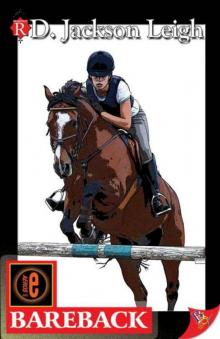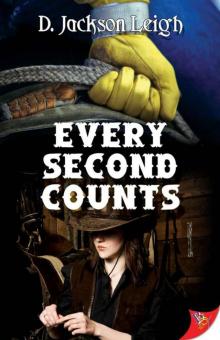- Home
- D. Jackson Leigh
Blades of Bluegrass Page 2
Blades of Bluegrass Read online
Page 2
“Oh, she knows. She even likes it when…” He cleared his throat. “Well, you don’t need to know that.”
She smiled and shook her head, letting the flush reddening his ears pass without comment.
Their informality wasn’t very military, but he’d been her boss and mentor since her army-reserve days. And, while he had an enlisted soldier assigned as his administrative assistant, Teddy was handling anything that pertained to their new project.
“So, our timeline? I know I don’t have to, but I’d like to give my landlady a heads-up.” Her efficiency apartment above her landlady’s detached garage was small and cheap, but living quarters were always temporary and not worth much investment, especially when you were single. The money she saved on housing had allowed her to buy her that fancy sports car.
“Don’t start packing yet,” Colonel Winstead said. “You know the military doesn’t move that quickly unless it’s a midnight deployment. I’m estimating eight months minimum before we’ll have clinic space allocated and set up and actually begin working with potential candidates.” He picked up a folder from the middle of his desk but leaned back in his chair instead of handing it to her. “I do want to have our team identified within the next month so they’ll all have time to disengage from their current assignments. I want to persuade an old friend at the War College to join us as an ethics consultant. I’m sure he’ll need to complete the current semester there before he can join us.”
“I hoped we’d be assigned offices in the Walter Reed complex.”
He nodded, fingering the edge of the file in his hands. “We might. But we could end up at Bragg, where there’s more room available. It’s closer to the researchers at Duke who are developing bionic limbs with sensory perception. Only certain amputees will qualify for our program, and we can have those who do transferred as soon as a week after their amputation surgery. We’re looking at an extended relationship with our patients, and DC is an expensive area. The cost of living in North Carolina would make it much easier for our patients’ families to relocate to be with them.” He tapped his finger against the manila folder. “But we have plenty of time to work that out. I have a priority assignment for you before we pull up stakes here.”
Teddy had stopped listening after “we could end up at Bragg,” her mind churning with that probability. She loved Shannon’s parents. They’d rallied around her like she was another daughter when the world didn’t want to recognize her significance in Shannon’s life. Later, after the funeral and she’d finally won the court battle to receive federal military survivor benefits, Shannon’s mom still hovered to the point that Teddy felt suffocated. She hadn’t yet opened the envelope on her desk because she knew it would be the same as every year—details of her visits to the cemetery and pleas for Teddy to visit.
“Lieutenant?”
Colonel Winstead’s sharp command for her attention snapped her from her thoughts.
“Sorry. Sorry, sir. What were you saying?”
“I was saying that I have a very important assignment for you, so I need your full attention.”
“Yes, sir. I’m sorry…I guess I drifted off for a minute. You have my full attention.”
“Good.” He laid the file on his desk and opened it. “Female soldier. Combat injury that resulted in amputation of her left arm just above the elbow three weeks ago. She’s technically still active duty, but assigned to extended medical leave and released from Walter Reed. I’m designating you to supervise her rehab.”
Teddy frowned. This wasn’t usual protocol. “Why here?”
“She’s elected to spend her recovery at her grandfather’s farm, which is about forty-five minutes from here.”
That made no sense. Soldiers didn’t get to pick where they wanted to rehab. They went where the US Army told them to go. “Why isn’t she rehabbing at Walter Reed?”
Colonel Winstead took a deep breath and blew it out before leaning forward and handing the file to her. “This is a special case, Teddy. Very high priority.”
“What’s so special about it?”
He averted his eyes. “Remember the surgeon who explained the special surgery required for the bionic prosthetic that allows a patient to actually experience sensation?”
Teddy remembered. His research and early results were amazing. “Yes. So…”
“That surgeon was flown to Landstuhl to perform this soldier’s amputation the day she was coptered in from the field hospital.”
“Wow. Who does she know to get that kind of treatment?”
“Her father is Senator Brock Story.”
Teddy frowned. “The guy rumored to be our next secretary of defense if the idiot in the White House is unseated in this year’s election?”
“That’s him. War hero. Chairman of the Senate Arms Committee. He has high-ranking friends in all branches of the service, powerful political friends, and is near the top in public-opinion polls. Hell, I don’t know why he isn’t running for president.”
She opened the folder and scanned it. “So, what is Captain Britt Story doing on a farm in Kentucky? If she had that kind of surgery, I’d expect her to be rehabbing near MIT or Duke to take advantage of their bionic-limb research programs.”
Colonel Winstead stood and walked around his desk to close the door. He returned to his chair but swiveled to stare through the office plate-glass window as though he was watching the therapists work with their patients. After a bit, he spoke.
“There’s something about this case the brass doesn’t want to talk about.” He turned back to Teddy. “It didn’t smell right to me either, so I put in a call to a buddy in Landstuhl. He couldn’t tell me much, but it was enough. The surgeon wasn’t the only one who showed up there. The senator did, of course. He’s her father. But Colonel George Banks, an old friend of the senator and commander of the sector where Captain Story was stationed, was summoned. Word is that Senator Story is grooming Banks, who’s also from Kentucky, to follow him in politics. So, him showing up isn’t necessarily a red flag. But my friend said he was in the hallway outside Captain Story’s room before they took her to surgery. He said there was a lot of yelling, and the captain kicked both of them out of her room. She was so angry the surgery had to be delayed while they sedated her twice to get her to calm down. Before she’d let them take her to the operating room, Story insisted the doctor write an absolutely no-visitors—even family—order on her chart.”
Teddy shrugged. “I guess she and her father don’t get along.”
Colonel Winstead frowned. “Maybe, but there’s more. Story was up for re-enlistment three weeks ago, but the army involuntarily extended her enlistment.”
Teddy shrugged. “That’s normal protocol until the medical-discharge paperwork is processed. What’s not protocol is letting her take leave and go home.”
He shrugged. “I’m getting pressure to accept her as the first candidate for our project. They want to return her to service.”
Teddy scanned the file again. “Is she black ops or something?”
Tom waited until she looked up from the file and met his gaze. “This is just between us, Teddy.” He waited until she nodded her consent. “Rumor says she knows something the brass doesn’t want her to talk about, something she can’t discuss if she’s still in the ranks.”
Teddy sighed. Seems like they always stuck her with the difficult patients. “So, when’s her first appointment here?”
“That’s the other thing. She isn’t coming to us. You’re going to her.”
Teddy stared at him. “You want me to drive forty-five minutes there and back every day?”
He shook his head. “Nope. Arrangements have been made to billet you there at the farm until you can evaluate her work challenges and teach her how to overcome them.”
“Are you kidding? Who in the world approved that?”
“Orders directly from Colonel, excuse me, General George Banks. He was just promoted.”
“But we’ve got a ton of work to do on our
project. Why not give this to someone else?”
“Because you’re a medic who went back to school and got double certified in physical and occupational therapy. You should be able to meet all her health and rehab needs.”
“But—”
“And, you can work on the project from there. Nobody has to be tied to an office these days. All you need are your notes, your laptop, and your cell phone. But Story is your priority, Lieutenant.”
“But—”
“Velvet gloves on this one. Both of those men—Senator Story and General Banks—will have a lot of power over military appropriations in the coming year. Especially funding for special projects like ours. They want Captain Story in our program. They want her to stay in the army. We don’t have to know why. We do have to follow orders.”
She stared at him. “I don’t have any choice in this, do I?”
“Has the army ever given you a choice?”
“Good point.”
Chapter Two
“Coffee on the stove is still hot if you want some. Your breakfast is in the oven, staying warm.” He looked up from the newspaper he was reading, his blue eyes peering at her over the top of his reading glasses. “Don’t get used to it. Breakfast is at six thirty. Same as always.”
Britt grabbed a mug from the drainboard next to the sink and poured herself a cup. She took a sip and grimaced. “Still drinking that cheap rotgut from the grocery, I see.”
“Beggars can’t be choosers. I like my coffee.” He frowned at her. “Where’s your arm?”
She ignored his question and carried her mug to the small kitchen table, taking the seat across from him. “You don’t fool me, old man. You like the lady that sells the coffee.”
He glared at her, then winked. “She’s not hard to look at,” he said, shoving the sports section to her. “Get that plate out of the oven and eat. You won’t be any help around here if you waste away.”
Their affectionate back-and-forth had let her block out the past months for a few minutes, but his reference to her physical condition cracked open the door holding back the black mood that had been her constant companion since she woke after surgery in Germany. “I’m not hungry.”
Pop put his paper down. “Yes, you are.” He rose, retrieved her plate, and plopped it in front of her. “I let it ride last night when you said you were too tired to eat.” He tossed a knife and fork down by her plate, then moved the butter and honey from his side of the table to hers before he sat again. “But you’re not getting up from this table until I see you clean that plate.”
The sausage, eggs, and two fist-sized biscuits did smell heavenly. Maybe she was hungry. She picked up her knife and contemplated her plate. The hospital had served only pre-buttered toast, and these were tall, fluffy, Southern biscuits. Not those dense, squat things that Northerners buttered on top. Southern biscuits screamed for a fat pat of butter to be placed inside. How to do this with one hand? She glanced up at her grandfather.
“You aren’t the first to get a wing clipped,” Pop said, never raising his eyes from the crossword puzzle he’d moved on to. “Figure it out before your eggs get cold.”
Britt grabbed the first biscuit with her hand and dug her fingers in to split it, then used her knife to butter it. She’d skip the honey today. “So, what’s on the agenda this morning?”
“Where’s your arm,” he asked again. “I know they gave you one.”
“Are you really asking me that?”
“You know what I mean. Your pro…pro…your fake one? They gave you one, didn’t they?”
“Prosthetic arm.” She pretended to concentrate on buttering her second biscuit. “I don’t like it, so I choose not to wear it.”
He peered at her over his readers for a long moment, then returned to her question. “If you’re up to it, I thought we’d tour the stables and hit a couple of pastures so I can catch you up on things.” He got up to pour himself the last of the coffee. “I’m sure you stopped at your usual place on the way in and saw Mysty.”
Her mouth full, Britt only nodded. Had Pop put Mysty in that pasture because he knew Britt usually stopped there? She wouldn’t put it past the gruff old codger.
“I bought her back for a song. She injured the suspensory ligament in her right fore, then suffered a stress fracture in the same leg when the trainer put her back on the track too early. It wasn’t really his fault. The owner was just too impatient and, after the second injury, was happy to unload her basically for the cost of her vet bill.”
“How’d she run?” Britt asked.
“She was coming along really well. When she turned up lame, she’d already won more than her yearling price and racing expenses.”
“She has great bloodlines for breeding.” Britt mopped up the last of her eggs with her second biscuit.
Pop shook his head. “The first season I bred her, she threw a fantastic colt that brought top dollar, but she had problems with the birth, and I think it must have messed up something inside. Her next two breedings didn’t take.”
“What do you plan to do with her?”
“I’ll put some feelers out to rehome her. The hunter people won’t be interested because her previous injuries would rule her out as a jumper.” He took her empty plate and put it in the sink, then turned back to her. “Unless you want her.”
“What would I do with her?”
“Ride her.”
Britt shook her head. Owning a horse was a commitment. “I’ll ride her to get the racetrack out of her until you find a home. I don’t need any more baggage than I’m already carrying. It’s all I can do to sort out my own mess.”
He held the door open for her and then followed when she stepped out onto the porch. It was another bright, sunny day. Grooms and horses were already moving through the morning routine around the barns and paddocks. Britt took a deep breath and smiled. Oh, how she’d missed this.
Pop laid his big hand on her shoulder and squeezed. “There’s no hurry to make any decisions about anything, kiddo. Horses are in your blood, just like they’re in mine. I’ve been waiting for you to get done playing with the army. Story Hill Farm is yours when you’re ready, Britt. But if you feel you have to go back to the army for a while, the farm will always be waiting for you.” He slipped his hand from her shoulder to her nape and pulled her to him, rubbing the white stubble on his jaw against her cheek. “I’m hoping you’ll stay.”
“Thanks, Pop.” Her throat tightened at his words and the familiar gesture that had always made her shriek as a young girl. She wanted to stay. Forever. But was it that simple? Could she just block out the world and everything that had happened? Could she put it all behind her and rebuild her life here? She had to get free of the army first.
* * *
Teddy mulled over the information she’d googled on Capt. Britt Story and Sen. Brock Story. If you believed media accounts and the Army Times’ profile on the two, the father and daughter had a close relationship. Brock Story spoke fondly of his daughter and her accomplishments. Britt Story’s regard for her father appeared close to hero worship.
She’d watched the short video that accompanied the online article at least ten times. Captain Story was an androgynous, albeit softer, slimmer, version of her very handsome father. Her smile was quick, and her blue eyes captured the viewer when she looked directly into the camera.
What she saw didn’t mesh with her medical file that described a sullen, barely communicative, and short-tempered soldier. Maybe Captain Story was a politician at heart, like her father. Maybe the side she showed the media was a careful façade.
Teddy was betting the real person underneath the conflicting persona was simply a soldier and patriot. In addition to Captain Story’s medical file, she’d reviewed Captain Story’s personnel file, which was filled with enthusiastic evaluations from her superiors, commendations for valor, innovative thinking, and excellent field leadership.
So, even though Teddy normally would have worn her dress uniform for the i
nitial introduction, she’d dressed that morning in field camos in the hope that Captain Story would more readily relate to that uniform. She smiled to herself. Well, a soldier in field dress and driving a crisp white convertible BMW. Too bad if Captain Story had a problem with that. She wasn’t dedicated enough to requisition a vehicle from the motor pool when she could glide along these winding two-lane backroads in her own smooth-handling ride, enjoying another sunny day and the rolling hills.
She slowed when her GPS indicated she was within a half mile of her destination. Dense woods crowded close to the ditch on the left side of the road, but to her right lay a patchwork of freshly mown pastures divided by dark wood fencing. Most of the pastures held small herds—mares with foals at their sides, half-grown colts and fillies. Wow. Was all this Story Hill Farm? More like Story Book Farm. She must have driven down a rabbit hole.
The dark fencing changed to white rails as she turned onto the wide crushed-gravel drive and parked next to a rambling two-story farmhouse with a porch that wrapped around three sides. Not exactly the mansion she’d envisioned, given the fancy Thoroughbred farms she’d driven past around Lexington. Calumet and Claiborne farms were famous for breeding, training, and racing many of the world’s fastest horses.
Teddy adjusted her hat, climbed out of the low sports car, and stretched. Downhill from the house, four long stables gleamed in the sunlight. The buildings, like the farmhouse, were white and roofed with dark-red metal. Multiple paddocks stretched outward from the stables, interrupted by a variety of things that reminded her of their rehab gym: several long lap pools, a circular contraption that reminded her of the pony rides at the fair, and several round corrals.
She eyed the house. Front door or side? The steps leading to the side door that faced the barns were worn from use, but protocol dictated she try the more formal front entrance first. Before she could walk that way, a stocky, silver-haired woman opened the side door and stepped onto the porch. Drying her hands on a dish towel, she smiled at Teddy.

 Ordinary is Perfect
Ordinary is Perfect Unbridled
Unbridled Blades of Bluegrass
Blades of Bluegrass Take a Chance
Take a Chance Swelter
Swelter Call Me Softly
Call Me Softly Bareback
Bareback Long Shot
Long Shot Every Second Counts
Every Second Counts Dragon Horse War
Dragon Horse War